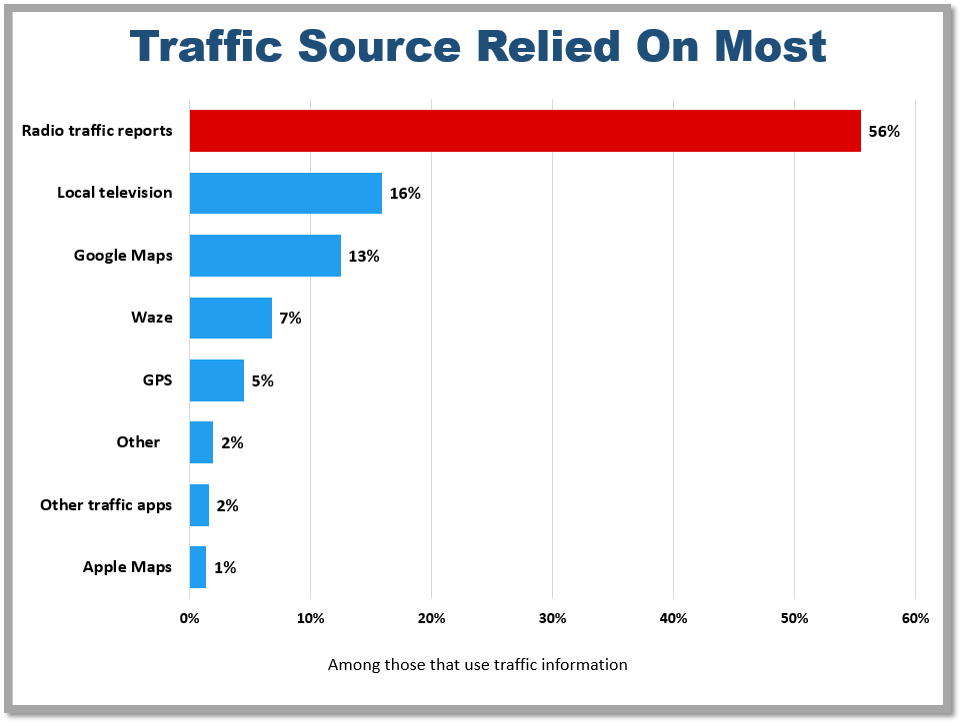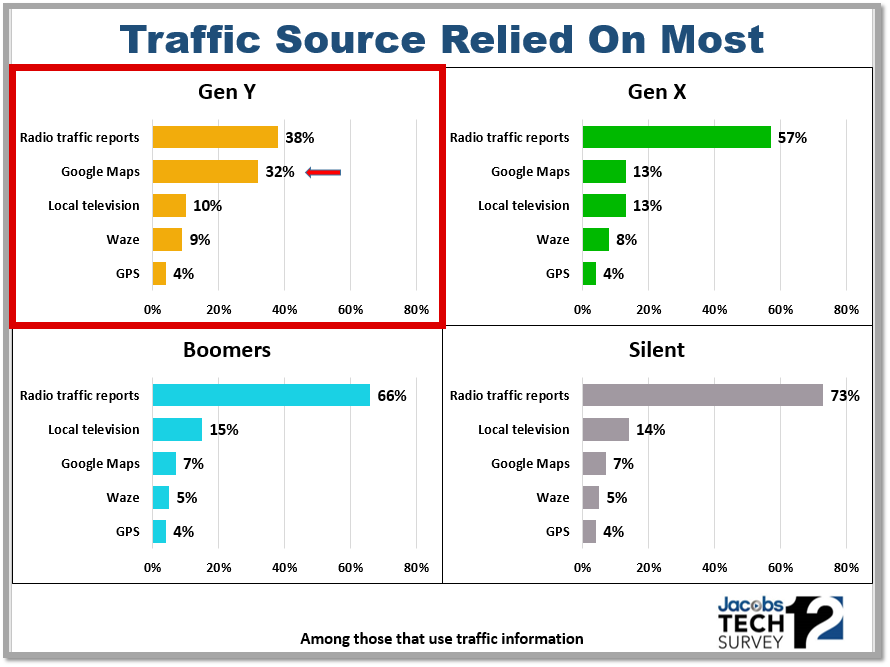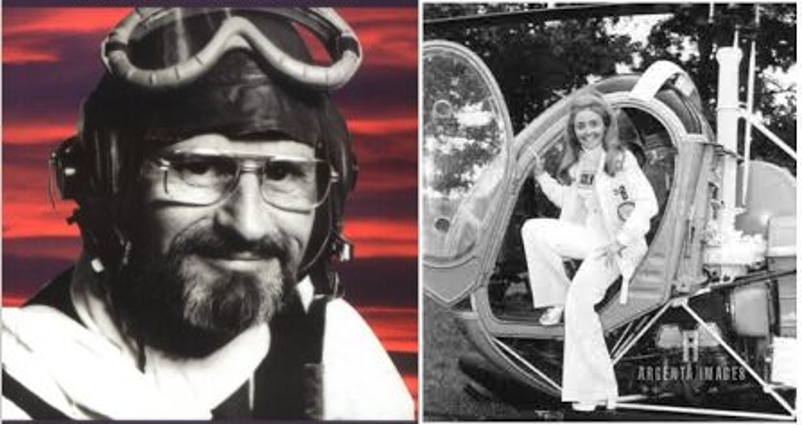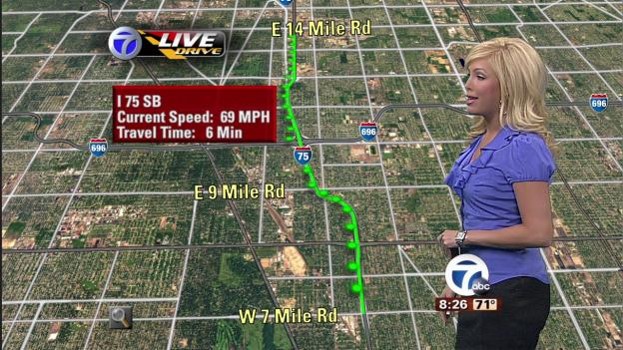This afternoon, we’re hosting a webinar based on our latest Techsurvey12 data, a deeper dive into the spreadsheet to pull out some nuggets of learning and insight.
We’ll be looking at areas like podcasting and the “connected car,” as well as the devices consumers use to wake up every morning. But a key focus is traffic information, and the changing ways in which consumers are accessing it.
This was a big topic at our DASH Conference back in 2014. Edison’s Larry Rosin suggested that radio traffic info could end up going the way of school closing reports if broadcasters don’t take steps to ensure their service is relevant, personalized, and even entertaining.
We blogged about the future of radio traffic this past November in a post called “The Beginning of the End for Radio Traffic Reports.” The catalyst for that post was the news that WAMU/Washington, D.C. had dropped its morning drive traffic information. Here was their explanation for the move:
“In a world now filled with smart phone map services, GPS devices in cars, and traffic apps, there is better, more up to date information available to our listeners than what we could provide.”
Of course, Hubbard Radio’s WTOP is across the street, and owns the traffic franchise in the market. Back in 2014, they announced a partnership with WAZE, a smart move that integrates the station’s amazing on-the-ground efforts with mobile traffic technology.
To get a sense as to how extensively apps like WAZE and Google MAPs really are used among drivers, we included traffic reports questions in TS12. We asked respondents who rely on traffic information to select the source they use most often:
 And it’s a good report for radio. A majority rely on radio traffic reports by better than a 4:1 margin over local TV traffic information. Close behind is Google Maps, then WAZE. So on the surface, radio’s got nothing to worry about.
And it’s a good report for radio. A majority rely on radio traffic reports by better than a 4:1 margin over local TV traffic information. Close behind is Google Maps, then WAZE. So on the surface, radio’s got nothing to worry about.
That is, until you look at this same question by generation. And then you see something very telling:

While radio traffic reports rule among Xers, Boomers, and those in the Silent Generation (born before 1946), those pesky Millennials in the upper left corner tell a different story. Radio has a very precarious lead over Google Maps. Nearly one in ten opts for WAZE.
So a partnership with a tech-traffic service – whether it’s WAZE or one of the other solutions – is clearly something for radio operators to consider. But there’s another element that comes into play that radio has all but forgotten – entertainment.
In the past, radio traffic reports weren’t just about helicopters, roadside vans, freeway cameras, and other conventions on-the-road info gathering tools. Great radio stations that wanted to own traffic looked for ways to make it fun, entertaining, and even sexy. They worked hard to win the image for “best traffic reports.”

WDAF’s “Sky Spy” was an incredibly popular traffic service element for that Kansas City station back in the ’70s. In audience research, these homespun reports delivered by John Wagner were buzzworthy. I should know – I did much of the research for that station when I worked for Frank Magid. People talked about those traffic reports, because whether you were stuck in bumper-to-bumper traffic on I-70, sitting at home in your kitchen, or working away in the office, you were laughing along as “Sky Spy” called out specific cars whose drivers weren’t contributing to optimal traffic flow.
And here in my hometown, they tried a different approach. CKLW became famous for its traffic reports because of the fun, flashy Jo-Jo Shutty, the first female traffic reporter in North America. At a time when everyone’s traffic reports sounded pretty much the same, The Big 8 stood apart because of her upbeat, bubbly reports. (Jo-Jo still does traffic reports today on WWJ.)
None of this has been lost on TV stations all over the nation. I recently showed this data to a television general manager who was surprised to see how well TV traffic fares in our survey. That was also a topic that Larry Rosin discussed at DASH as well.
Of course, you don’t need to be a skilled researcher to understand the appeal of television traffic reports:

Accurate traffic reporting, a large network, and tech traffic services all make a difference. But the element that radio can bring to the party that sets it apart from all those apps is the human, fun, and entertainment factors – attributes that have been left curbside over the years.
There’s a lot of revenue riding on these reports. A peripheral glance at those Millennials is your early indicator of where this space is headed.
You’ve got until noon ET today to sign up for our free webinar “How Radio Audiences Use Technology: Key Takeaways from Techsurvey12.” We’ll be taking a look at some of the biggest findings that will impact radio in 2016 – and beyond.
- Radio + Thanksgiving = Gratitude - November 27, 2024
- Is It Quittin’ Time For SiriusXM? - November 26, 2024
- Radio, It Oughta Be A Crime - November 25, 2024




The best traffic reports come from radio “personalities” that inject themselves and their styles INTO the reports. 98% of Traffic reporters all sound the same – boring, matter-of-fact and it’s not exciting if you’re brand is fun.
No doubt about it, Troy. And that’s why we made it a point to acknowledge some of the big traffic personalities of the past. Wish we had more today. Thanks for the comment.
Love this read Fred and I recall a “healthy” discussion with Larry at that very DASH conference about this topic. :0 You’re right on all the fronts about being aware of where things are heading, as the digital dash improves in all cars…but for now, we can do better work.
I maintain that a great traffic report with relevance is still a tremendous value to the average consumer that hasn’t quite grasped the entire world of the DASH.
I just sent this note around to my programming team talking about living like the consumer lives, not like we live in the glass studio. A Sh***y traffic report with outdated info and no relevance to the area affected…worse than ever. The change between “a breakdown on the *** bridge” versus a “wreck on the *** bridge that will cost you about 6 minutes from the downtown and 9 minutes from the south side, but it’s cleared”. Miles of difference #punintended
Great read and topic.
Dave, spot-on. Mailing in traffic reports is a sure road to oblivion and irrelevance. Leveraging radio’s strengths – local knowledge, people on the ground, and entertainment value – is the formula for maintaining a healthy audience for traffic reports now and into the future. Thanks for the comment.
Budget reductions, technology and social media have changed the way all information elements are consumed – not just traffic. School closings is the obvious example of the digital migration (as noted in a previous JacoBlog), but it also applies to sports (stats on your fantasy lineup) and business (your portfolio).
It is not an “either-or” situation. Broadcasters do not need to drop these services, but rather reexamine the way they are presented; and seek mobile opportunities – recognizing that an increasing number of commuters (or sports fans, or investors) turn to more than one source.
Go where your audience is going. Programming and service aside, revenue dictates this shift – responding to increasing digital dictates from media buyers.
I strongly agree with Fred’s observations regarding the need for more personality in traffic reporting. Another issue is lack of credibility. Most traffic reports come from network services where the announcer is often tasked with reports only minutes apart – in multiple markets – making it difficult to sound authoritative. This is not a knock on the hardworking reporters or the traffic vendors, but a budget reality resulting from the business model.
Gary, thanks for the insightful comments. You’re right that economic efficiencies have impacted the value and of radio traffic reports. To deliver this information to multiple stations – and to keep those sponsorship dollars flowing – reporting has been streamlined and made uniform. As a result, it has made them more disposable and much less entertaining. The personality factor may indeed by radio’s secret sauce – something to think about in the face of this data. Appreciate you reading our blog.